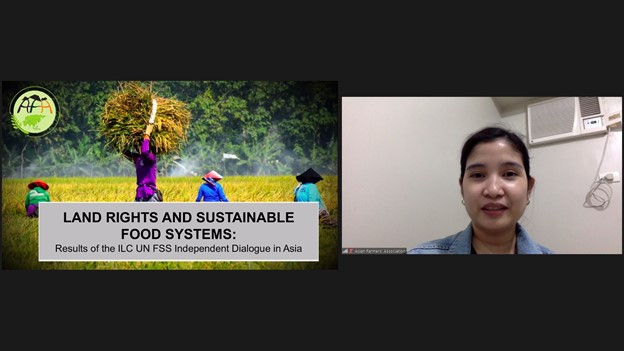“Secured tenurial rights is the basic foundation of sustainable food systems. It is the bare minimum needed to empower farmers, landless and other marginalized groups to actively participate in a food system that is already extremely unbalanced.” This is the key insight raised by the Asian Farmers Association for Sustainable Rural Development (AFA) in key events leading up to the UN Food Systems Summit (UN FSS) in September.
On 28 July 2021, the International Land Coalition (ILC), the Land Portal Foundation, RVO, and LANDac organized the UN FSS pre-summit session entitled the “Centrality of Land in Building Sustainable Food Systems”. The session aimed to create awareness on the centrality of land for sustainable food systems, build consensus on the best practices and policies needed to foster land tenure, and mobilize support for a coalition of action. It brought together speakers from ILC members from LAC, EMENA, and Asia to present the results of the UN FSS regional independent dialogues (IDs).
As co-convenor of the ILC UN FSS ID, AFA shared the challenges and issues in promoting secure land tenure, the solutions needed to overcome these challenges, and the possible partnerships that will facilitate these solutions, which were identified by participants from more than 60 FOs, NGOs, academe, IGOs and private sector working in Asia and the globe. Here is a transcript of part of the presentation delivered by Ms. Myline Macabuhay, AFA Coordinator for the Young Farmers and Land Rights Agenda: Land_Rights_and_Sustainable_Food_Systems
“For the women and youth, the [ID] participants highlighted the lack of recognition of women and youth in agriculture. For instance, a significant portion of women in rural areas are engaged in agriculture, but they do not have any ownership and decision-making power on the land. This lack of ownership means that their husbands or other landowners can easily sell or give up their land and impede women’s livelihoods. Also, they are not eligible for getting access to government facilities such as credit, bank loans, etc. Meanwhile, young farmers’ lack of ownership of land makes it difficult for them to make decisions to cultivate it….
For pastoralists, there is a lack of recognition of pastoralists as food producers, leading to a lack of ownership in rangelands and conflicting uses and interests on the land, which further limits sustainable management of the land. There is also restrictions in mobility and lack of infrastructure support for pastoralists, as well as lack of access to information about rangelands.
For indigenous peoples and communities, the lack of recognition of ancestral domain/ customary land remains to be a huge issue. Land conflicts/ land grabbing have increased in the past decades. We also noted the conversion of land use and the promotion of economic crops such as oil palm, rubber, cocoa, etc. For landless farmers, they remain to be excluded in the discussion. Land administration is characterized by a complex administrative structure and regulatory barriers, and access to community resources have been difficult to maintain.”
Meanwhile, solutions to overcome these challenges and issues already exist and need to be highlighted. In the AFA-led UN FSS independent dialogue held last 1 July 2021 via Zoom, members shared some of their game-changing solutions. For instance, AFA’s member in Nepal, the Nepal Land Rights Forum, has been successful in pushing for equal inherited rights for sons and daughters. Their campaign for the passage of the Joint Land Ownership (JLO) Act enabled women to be included in the land ownership registration. Since its inception, more than 15,000 women have received JLO in the country.
Other AFA members have also implemented game-changing solutions to secure the tenurial rights of family farmers and local communities. Under policy advocacy, AFA members strive to increase the understanding of farmers on existing policies on land; conducting consultations and roundtable dialogues to identify and address gaps. For example:
- AFFM-Myanmar advocated for the amendment of national policies such as the Farmland Law, the Vacant, Fallow, and Virgin Law, among others, and filed legal cases to retrieve farmers’ lands. From 2014-2020, they were able to retrieve a total of 30,400 has of land for 1,746 farmer households.
- API-Indonesia has successfully initiated the allocation of 3.6m has of forest area to become part of a social forestry program.
- LFN-Lao advocates for the use of community then move for direct financing to FOs to scale up and scale out our experiences as well.
In addition, AFA members advocate for improved land management. For example,
- KAFFLU-Kyrgyzstan practices community-based forest management where communities are granted access to 1,045 has of state forest land
- NAMAC-Mongolia uses a mobile phone application for pastureland management
Lastly, AFA, as the regional focal point of the Land Matrix Initiative, collects data on land investments in the region to assess their impacts on the land rights of farmers, IPs, and local communities. AFA initiates data campaigns in Asia and provides technical support for the National Land Observatory in the Philippines (PAKISAMA). This includes conducting participatory mapping to protect farmers’ and IP’s rights to land and natural resources (e.g., Stop Kaliwa Dam campaign, APECO land distribution campaign, Bugsuk land distribution). Click this link for a copy of the full presentation: AFA_Land_Rights_Game_Changing Solutions




Comments are closed